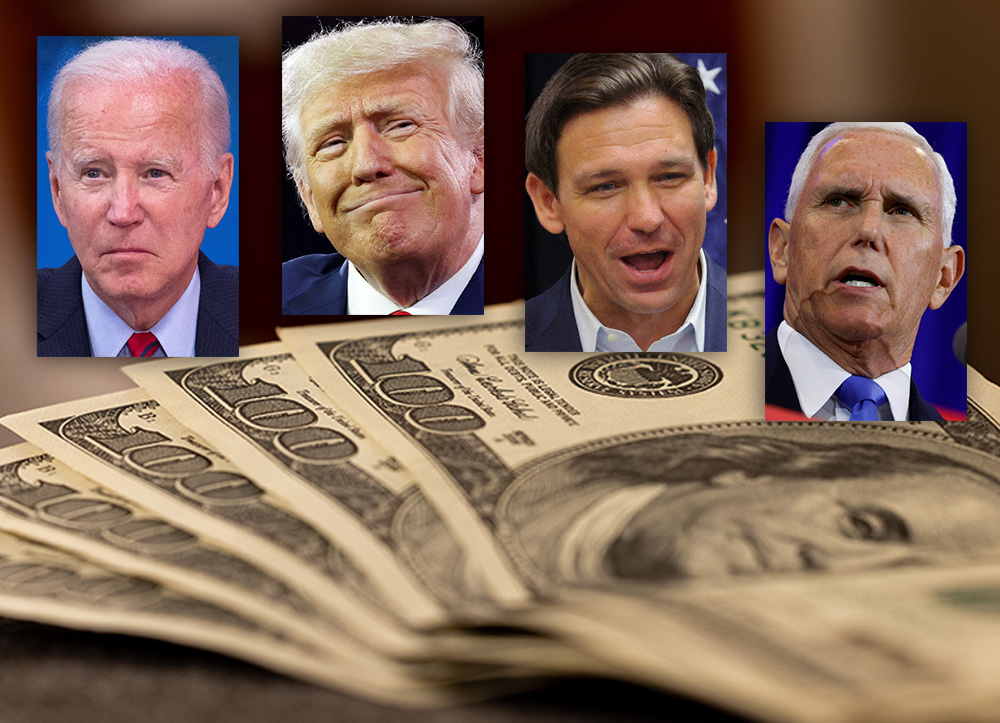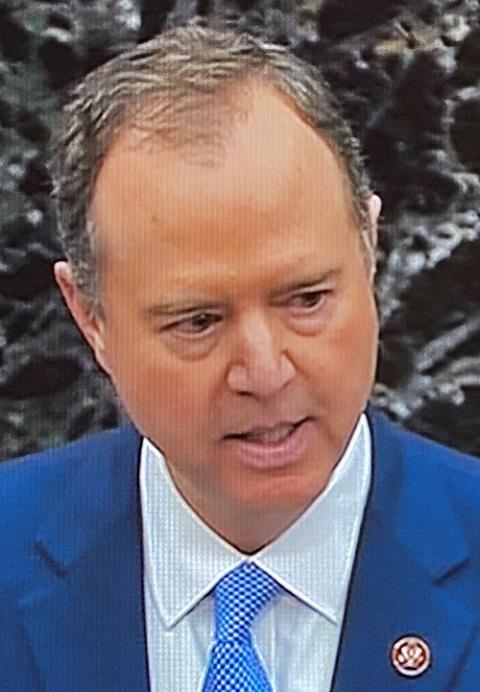
From left: President Joe Biden (OSV News/Reuters/Tom Brenner); former President Donald Trump (OSV News/Reuters/Elizabeth Frantz); Florida Gov. Ron DeSantis (OSV News/Reuters/Brian Snyder); former U.S. Vice President Mike Pence (OSV News/Reuters/Jonathan Ernst). Background photo: (Unsplash/Engin Akyurt).
In the early stages of a presidential nominating contest, all political prognosticators turn into Jerry Maguire: "Show me the money." Polls are driven by name recognition at this stage of a race and, just so, are ephemeral. But the ability to raise campaign funds is real, it is quantifiable. There are limits to which a press secretary can spin a lousy number; a superlative number speaks for itself.
With the release of the campaign fundraising reports, the most obvious takeaway is that the best way to rake in the big bucks is to be censured by the party opposite or to get yourself indicted.
The indictments, filed or pending, against former President Donald Trump did not dent his fundraising haul. He took in $35 million, although that data point is clouded because it includes campaign cash and money raised for his PAC.
The more significant number is $34, which was the average donation to Trump, a source told the Washington Post. That small number indicates that Trump's army of small donors remains loyal to him and he can go back to them again and again as the campaign unfolds. They will never max out on their contributions or on their loyalty to the candidate.
The fact that Trump has been indicted doesn't matter to the GOP base. Indeed, it likely helps him.
On the other hand, Florida Gov. Ron DeSantis, who raised a respectable $20 million, relied heavily on people able to give the full $3,300 allowed by law. That means they maxed out and can't give any more. $13.8 million of his total came from these donors.
Watch for his super PAC to step up and raise millions in dark money, that is, unlimited amounts from donors who do not have to disclose who they are. Somehow, it seems appropriate for a candidate whose message is so dark to end up reliant on dark money.
The biggest loser on the GOP side was former Vice President Mike Pence. He raised less than $1.2 million during the three weeks from the time of his announcement and the end of the quarter. Even allowing for the shortened time frame, that is a pittance.
Just as bad, it looks like Pence, and former Arkansas Gov. Asa Hutchinson, may not reach the threshold of having received 40,000 donations needed to gain a podium at the first GOP debate next month. If either man misses that stage, he is toast.
The takeaway? Trump's polling numbers — he is sitting at 53.8% in the Real Clear Politics average of polls — reflect the reality on the ground. Trump's ability to raise so much money from small donors shows he still has a lock on the GOP base. The fact that he has been indicted doesn't matter to them. Indeed, it likely helps him: He dominates the news cycle, casts the indictments as a witch hunt, attacks his enemies, and the GOP base eats it up.
Something similar happened on the Democratic side in the race to succeed retiring California Sen. Diane Feinstein. Democratic Rep. Adam Schiff, who was censured by House Republicans in June for his role in investigating Trump, brought in twice as much as his two closest rivals for the Democratic Senate nomination in California combined. Schiff took in $8.2 million in the second quarter, while Rep. Katie Porter raised $3.1 million and Rep. Barbara Lee raised a paltry $1.1 million.
Lee's super PAC announced it had raised $1.5 million in the second quarter and was aiming to raise another $8.5 million in order to make the Oakland Democrat a contender. Super PACs, however, are barred from formally coordinating with a candidate's campaign. Consequently, any ads they generate are almost always negative attacks on their opponents. If they mimicked what the official campaign was saying about the candidate they support, the Federal Election Commission might conclude there had been illegal collusion.
Negative campaigning is so prominent because: a) a super PAC can attack the opponent without coordinating with the candidate they support and b) it works. Especially in a large state like California, with distinct media markets, a congressperson from the Bay Area, like Lee, may be almost entirely unknown in the Los Angeles area.
Schiff and Porter both hail from Southern California and are known quantities on LA's TV stations. The person with the most money gets to define their opponent on the airwaves.
Advertisement
Schiff's censure by the GOP, however, earned him headlines throughout the country and served up the perfect campaign theme: I am the guy the Republicans do not want in the Senate!
One other number jumped out from the campaign finance reports: President Joe Biden's campaign only spent $1.1 million, less than most of his GOP opponents and less than some Senate candidates. This reflects one of the oldest political maxims in the book: When your opponents are trashing each other, stand aside.
Of course, no one should forget how ridiculous it is that we Americans spend so much on campaigns, and how long our campaigns run. I am not a fan of the parliamentary system, but in one regard, it is highly preferable: Campaigns are short. In Canada in 2015, our neighbors to the north had their longest campaign on record: 11 weeks. In Japan, by law, the campaign season is 12 days.
With those shorter campaign seasons, the need for cash diminishes. And, in Japan, candidates get equal amounts of free air time so they do not have to raise money for ads at all.
Wouldn't it be nice if our political leaders were raising money to alleviate poverty or to tackle homelessness instead of all these millions going for self-promotion?






